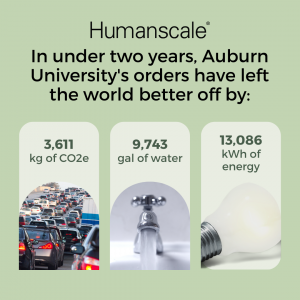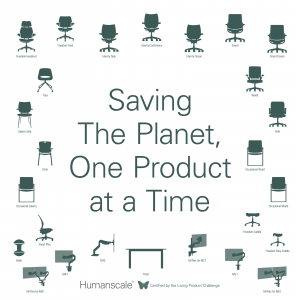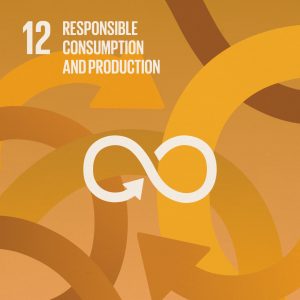By Mike Buhmann and Stephanie Richardson
 In 2021, Auburn University purchased over 800 chairs from Humanscale (the premier designer and manufacturer of ergonomic and sustainable furniture) for use in several departments around campus.
In 2021, Auburn University purchased over 800 chairs from Humanscale (the premier designer and manufacturer of ergonomic and sustainable furniture) for use in several departments around campus.
 This leaves the world better off by conserving and returning:
This leaves the world better off by conserving and returning:
- 3,611 kg of CO2, which equates to not driving over 9,073 miles.
- 9,743 gallons of clean water, equal to over 566 showers.
- 13,086 kwh of energy, the equivalent of 1,090,500 smart phone charges.
All of this was possible by purchasing task chairs! Pretty cool, huh?
How was this accomplished?
Over the last 20 years, the phrase “environmental footprints” has become quite common in our vernacular. Footprints represent the damage we inevitably create by consuming resources and emitting pollution. No matter how small these environmental footprints are, they still have a negative impact on our planet.
Strategies on reducing one’s environmental footprint are already well documented. While creating behaviors that give back to the environment are still a relatively new concept, it’s one that everyone can easily partake in.
Over the years, Humanscale has been working toward an overall net positive impact on people and the planet. Reducing our manufacturing footprint was a good place to start, but we knew being “less bad” was just not good enough. This is where the concept of handprints, or positive impacts, comes into play.
 We are proud to be the first company ever to offer any product – let alone 26 – that is certified climate, energy, and water positive. 26 of our products have been certified net positive – meaning any time they are made, the planet is measurably better off. This is recognized and audited by the International Living Future Institute.
We are proud to be the first company ever to offer any product – let alone 26 – that is certified climate, energy, and water positive. 26 of our products have been certified net positive – meaning any time they are made, the planet is measurably better off. This is recognized and audited by the International Living Future Institute.
So, what is a Handprint?
In contrast to footprints, handprints are the measurably positive impacts individuals or companies create that leave the world better off. When added together, footprints and handprints determine an organization’s net impact. In other words, when our cumulative handprint exceeds our footprint, we know we are having a net positive impact on the planet.
Humanscale creates carbon, energy, and water handprints for 26 of the products we manufacture, which account for over 70% of our revenue. By doing so, when manufactured, our products have a 10% net positive environmental impact in each category. Humanscale is continuously creating handprints to maintain net positivity for these products.
So, how is this accomplished?
Since 2016, Humanscale has sponsored a variety of projects that have positive social and environmental impacts. For example, through a partnership with the nonprofit RE-volv, Humanscale sponsored the installation of 25 solar panel projects at nonprofits across the United States. These projects provide a source of onsite renewable energy and result in reduced energy bills. The money saved on energy is then redirected within these organizations, which expands their reach.
Some of the nonprofits that have benefitted from this partnership include an animal shelter, affordable housing complexes, a rehab facility, and food pantries, among others. Over these projects’ lifespans, 113 million kilowatt hours of renewable electricity will be generated. This will result in a handprint equal to 50,000 tons of carbon and 52 million gallons of water.
Most recently, Humanscale partnered with BridgIT Water Foundation to sponsor the refurbishment and installation of 20 wells in rural India. The project will immediately provide over 17,000 people with clean water. Over the next five years, over 98 million gallons of clean water will come from these wells. This is equivalent to 150 Olympic-sized swimming pools.
Auburn University’s choice of working with Humanscale produced a measurable, net positive impact on the environment. We hope other organizations across the planet start asking their suppliers to do the same.
While certainly not easy, we feel with a little bit of education, some hard work, and perseverance, we are all capable of Handprinting our way to a better world.
To learn more about Humanscale and our environmental efforts, visit our website.
Mike Buhmann and Stephanie Richardson work within the Humanscale Sustainability Team.
Learn about the SDGs & AU and our contributions related to this post.





